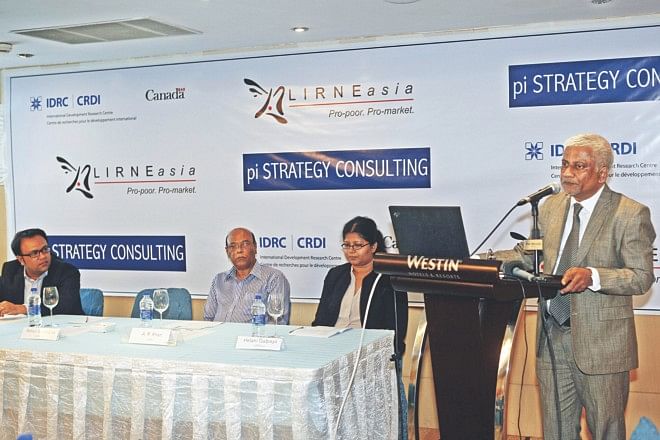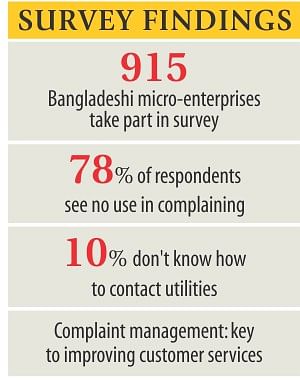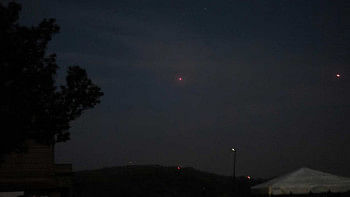Dismal customer service for electricity users

About 80 percent of micro-entrepreneurs find no point in registering complaints with local electricity distributors when they encounter any problem, a new study found.
The research by Sri Lanka-based LIRNEasia and Dhaka-based pi Strategy Consulting said a small percentage of micro-entrepreneurs said they do not know how to contact the utility service providers, while a few said they were too scared to complain.

Titled 'Improving CRM Practices in Electricity Sector', the study examined the customer relationship management (CRM) practices of electricity and telecom sectors in Bangladesh, India and Sri Lanka.
The survey, which ran between October 2012 and January 2013, covered 3,180 micro-enterprises: 1,279 in India, 915 in Bangladesh and 986 in Sri Lanka. Additionally, services providers were included in the survey.
It said the most challenging task in CRM is perhaps complaint management and recommended that local electricity distributors improve the quality of their customer services by embracing experiences of telecom operators.
Each of the electricity distributors should have round-the-clock dedicated call centres so consumers do not need to visit the customer care centres for minor troubles, it said.
Only Dhaka Electric Supply Company Ltd offers a round-the-clock call centre service.
The study indicates that the best form of demand-side management is to shift consumers away from using electricity at times of peak demand. In order to do this, time-of-day billing or metering must be introduced.
This requires policy change, and significant capital investment in the form of installing smart meters, said the study.
Information such as approximate consumption of electricity by commonly used household appliances can be printed on the back of electricity bills.
Overall, customer relationship scenario in the telecom sector is different when compared to the electricity sector.
About 85 percent of Bangladeshi users responded that they were treated nicely during a telecom customer service session and 74 percent believe that the information they received were relevant and was available easily.
In Bangladesh, CRM practices in telecom are comparatively more advanced than in the electricity sector, said the study.
The study found no specific examples of surveys and analysis on the part of the distributors to identify unmet or latent needs of potential customers.
So far, none of the distributors were found conducting any large scale survey to collect usage data and perform analysis to know existing customers better, it said.
Of the five distributors, only Rural Electrification Board (REB), Dhaka Electric Supply Company Ltd (DESCO) and Dhaka Power Distribution Company Ltd (DPDC) accept online application.
Only REB and DESCO accept online bill payment. However, all five distributors, which also include Power Development Board (PDB) and West Zone Power Company Ltd (WZPDC), receive mobile bill payment.
Of the five, only REB does not have any load-shedding forecasting mechanism.
All of the distributors have help line, while PDB and DESCO have launched pre-paid metering.
Speakers at the unveiling of the study blamed the lack of competition among power distributors for poor level of customer service, as only a single state-run company operates in a region.
Pial Islam, managing partner of pi Strategy, underscored the significance of innovation in electricity distribution sector.
“There are pockets of innovative experimentations taking place in the electricity sector. However, these need to be objectively evaluated and further refined before deploying them on a wider scale.”
Helani Galpaya, chief executive officer of LIRNEasia, said the study was done through surveys of low-income micro-entrepreneurs and detailed interviews with service providers.
The intent was to explore challenges these sectors face now and to identify solutions that have already been successfully implemented in one sector and could possibly be replicated by the other, she said.
The study said despite some recent initiatives by distributors to better serve the customers by introducing online/mobile services, most of the customer services still remain poor due to weak design of such services.
Rohan Samarajiva, founding chair of LIRNEasia, said the electricity distributors would have to look at the consumers as resources, not as annoying beings.
“Customers can provide valuable information on the utilities' failures and faults in providing standard services. Their complaints should be seen as feedbacks.”

 For all latest news, follow The Daily Star's Google News channel.
For all latest news, follow The Daily Star's Google News channel. 



Comments